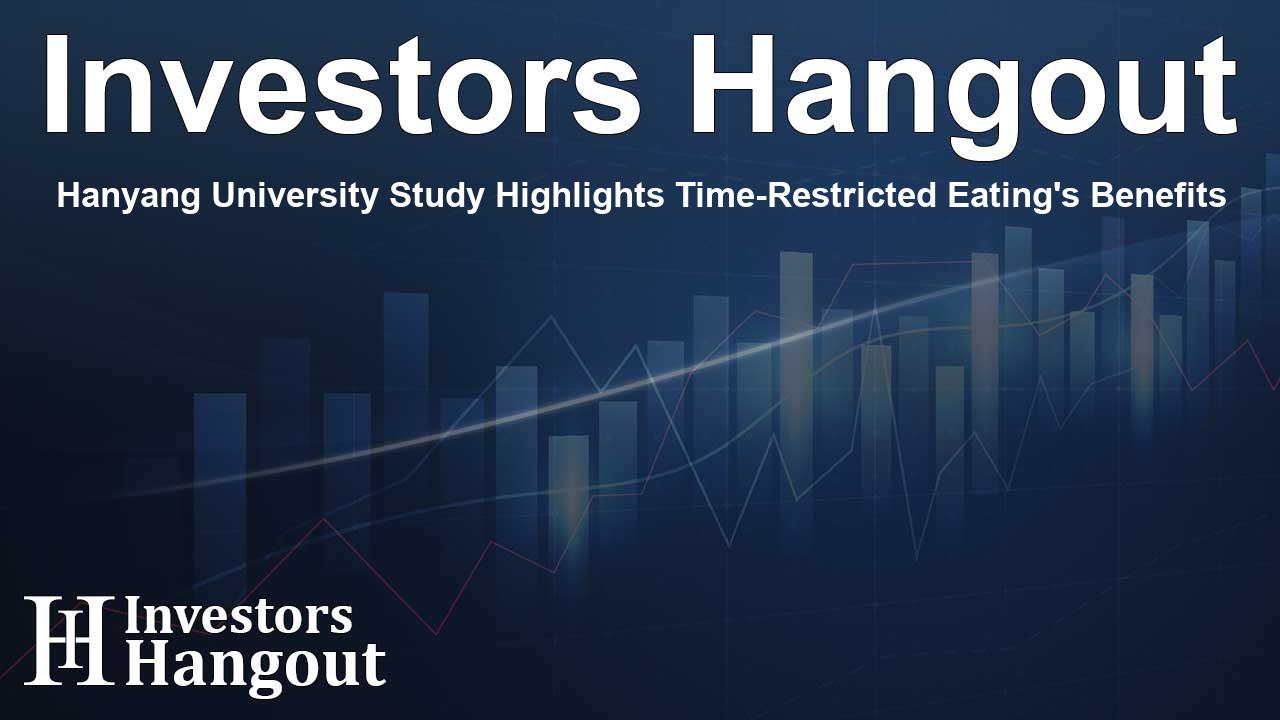Hanyang University Study Highlights Time-Restricted Eating's Benefits

Researchers at Hanyang University Investigate Eating Patterns
A new study examined the advantages of time-restricted eating (TRE) among patients suffering from metabolic dysfunction-associated steatotic liver disease (MASLD). This eating style is a type of intermittent fasting that holds promise for improving weight loss, insulin resistance, and body composition.
The Impact of Time-Restricted Eating
This research indicates that TRE not only has the potential to enhance weight loss but also effectively improves the metabolic parameters linked with MASLD. As researchers delve deeper into the effects of this dietary pattern, they are vying to establish TRE as a realistic dietary method for managing MASLD.
Understanding Metabolic Dysfunction-Associated Steatotic Liver Disease
Metabolic dysfunction-associated steatotic liver disease (MASLD) is characterized by an excess of fat in the liver, a condition closely linked to a range of metabolic risks. Managing MASLD effectively requires addressing these underlying factors through improved diet and physical activity strategies.
Study Overview: Methodology and Results
Under the leadership of Professor Dae Won Jun, Hanyang University researchers sought to determine how time-restricted eating could support patients with MASLD. The study involved participants with overweight or obesity, who were divided into three groups — the standard of care (SOC) group, a calorie restriction (CR) group, and the TRE group. The team then monitored improvements in liver fat and various health indicators.
Key Findings of the Research
Significant reductions in liver fat, body weight, and visceral fat were observable in both the TRE and CR groups. Remarkably, participants practicing TRE achieved these results by simply limiting their eating window, retaining their usual meal choices. This shows that TRE could indeed be an easier method to adhere to, especially for those in various cultural contexts.
Despite similar improvements seen in both TRE and CR groups regarding blood glucose and cholesterol levels, it appears that TRE does not offer additional benefits over traditional calorie restriction strategies.
The Relevance of TRE in Today's Health Landscape
Given the rising prevalence of obesity globally, it is vital to establish solid evidence-based dietary guidelines. This study can assist in dispelling myths surrounding various dietary trends and proves that both TRE and CR are effective in managing MASLD. Individuals should analyze their lifestyle to choose the dietary pattern that fits them best.
Looking ahead, findings from Hanyang University's investigation could pave the way for more personalized dietary approaches. Tailoring dietary strategies to accommodate an individual's lifestyle, cultural context, and biological requirements can lead to more sustainable weight management and the prevention of metabolic disorders.
About Hanyang University
Hanyang University is a prestigious educational institution dedicated to advancing academic research and innovation in various fields, including health sciences.
Frequently Asked Questions
1. What is time-restricted eating?
Time-restricted eating is an eating pattern where individuals consume their daily caloric intake within a specific timeframe, often leading to improved metabolic health.
2. How does MASLD affect the liver?
MASLD causes excessive fat accumulation in the liver, leading to potential liver damage and various metabolic disorders.
3. What were the main findings of the Hanyang University study?
The study found that TRE effectively reduced hepatic steatosis and body weight among patients, comparable to calorie restriction methods.
4. Who led the research at Hanyang University?
The research was led by Professor Dae Won Jun, with a focus on finding effective dietary approaches for MASLD patients.
5. Why is the study's outcome important for obesity management?
This research offers valuable insights for developing effective dietary strategies to aid in obesity management and prevent related diseases.
About The Author
Contact Owen Jenkins privately here. Or send an email with ATTN: Owen Jenkins as the subject to contact@investorshangout.com.
About Investors Hangout
Investors Hangout is a leading online stock forum for financial discussion and learning, offering a wide range of free tools and resources. It draws in traders of all levels, who exchange market knowledge, investigate trading tactics, and keep an eye on industry developments in real time. Featuring financial articles, stock message boards, quotes, charts, company profiles, and live news updates. Through cooperative learning and a wealth of informational resources, it helps users from novices creating their first portfolios to experts honing their techniques. Join Investors Hangout today: https://investorshangout.com/
The content of this article is based on factual, publicly available information and does not represent legal, financial, or investment advice. Investors Hangout does not offer financial advice, and the author is not a licensed financial advisor. Consult a qualified advisor before making any financial or investment decisions based on this article. This article should not be considered advice to purchase, sell, or hold any securities or other investments. If any of the material provided here is inaccurate, please contact us for corrections.
